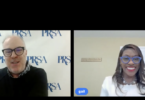via: zeitfaenger.at
After spending more than half of your life in school, once the zeal of being finally finished with classes, tests and general academia have worn off, like thousands of others, you’re probably stuck somewhere between a feeling of relief and uneasy anticipation.
From actually finding a job to knowing what to expect out of your career, it can be difficult to anticipate what the next step in life will bring. While we often offer advice on landing your next gig, interviewing or how to be a better pro, we also understand that sometimes you just want to know the answer to one question: “What’s next?”
Transitioning from a Public Relations student to post-grad practitioner will often bring with it a number of new emotions. Although you may have been able to secure multiple internships, you may find that real world public relations isn’t quite what you expected.
PRSA’s New Professionals Section is a great resource for bridging that gap. I’ve checked in with some of our New Pros leaders to gather intelligence on what PRSSA members who are considering joining PRSA can expect and more broadly for a little advice on what to anticipate when you’re in your first few months out of the classroom and finally in the field.
Consider this your New PR Pro’s Survival Guide.
Heather Sliwinski, PRSA New Professionals Section Chair and account supervisor at Grayling US, is the first in our series to provide her feedback regarding what you can expect when it’s time to “grow up.”
Q. What is one thing someone preparing to graduate (or who has already graduated) with a PR or communication degree should do right now (literally today) to help their career?
HS> It’s so cliché, but it’s never too early to network. I wasn’t in PRSSA in college, so I didn’t have a big network of PR professionals in the industry. In the tough economy, fewer connections hurt you when applying and interviewing for jobs, which means your search might take longer. Sure, you need to have the talent and experience to back up your resume once you have a foot in the door, but mutual connections are a great way to find opportunities and then get your resume to the top of the pile.
Q. Is there any rest for the “wickedly determined?” Can a recent grad take the summer “off” and prep for their interviews in August?
HS> My experiences have shown me that the professionals who are hungry and passionate will have their pick of opportunities. In business, those who speak up for what they want, ask for new opportunities to grow and stretch their skills will move ahead much quicker. If that doesn’t convince you, “gaps” in employment are much harder to explain in interviews!
Q. Did you consider not joining PRSA once you graduated college and entered the profession?
HS> I didn’t join PRSA until I had settled into my first full-time job, about a year after graduation, because of the cost for membership. I decided to join because I worked at a small business and wanted to increase my network of PR peers and resources. Once I joined PRSA and got involved with the New Professionals Section; I only wish I had joined sooner. Having the extended network of new PR graduates and seasoned professionals was a great way to learn best practices and also help guide my early career. PRSA members are so helpful and willing to help new grads out – all you need to do is ask!
Q. How has being a PRSA member helped your career?
HA> Since joining PRSA, every PR position I’ve held was found through a connection I made through PRSA. Along the way, I’ve also made friends and confidants who have served as sounding boards and helped me reach my career goals
Q. What is one of the best experiences you’ve had as a PRSA member?
HS> I have to say that being the blog co-chair for the New Professionals Section was the best experience I had as a PRSA member. Not only did I meet and work with fellow new pros, but I learned so much from seasoned professionals who guest blogged for us. The members I worked with are still people I can count on for advice for a quick question or a bigger career decision. I also greatly enjoyed reading, writing and feeding the blog with content that New Pros members found helpful as they began their careers.
Q. What leadership positions have you held in PRSA since you joined?
HS> I’ve been a member of PRSA for about five years, and a majority of those have been spent on the PRSA New Professionals Section Executive Committee. For three (fantastic) years, I was the blog co-chair for The Edge, and now I serve on the Committee as Section Chair. While this is my last year in the New Pros Section, I know I’ll be involved in PRSA leadership in some shape or form in the future!
Q. Anything other advice to offer?
HS> When you first graduate with your communications degree, you can feel like a small fish in a very big ocean. PRSA helps make that ocean a little smaller and friendlier.
Also check out Heather’s article covering “The Delicate Art Of Work/Life Balance” on PRSA’s ComPRehension blog channel.
Heather Sliwinski is an account supervisor at Grayling US, a global public relations agency, specializing in technology. She has provided media relations and social media services to some of tech’s most innovative companies. She earned a bachelor’s degree in journalism and mass communications – strategic communications from the University of Wisconsin-Madison. Feel free to connect with her on LinkedIn or Twitter.
Laurent Lawrence is associate director of public relations at the Public Relations Society of America.








[…] connections hurt you when applying and interviewing for jobs,” in an article for the “New PR Pro.” LinkedIn was huge when it came to this, so I was thankful that I’d built up my professional […]